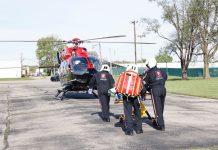While short summer vacations help students retain more of what they learned, the two-month break also creates challenges for road crews working near schools.
That was evident Aug. 3 as many adults dropping off Clifty Creek Elementary School students came upon a surprise on the first day of classes.
As the drivers turned off U.S. 31 onto County Road 50N just west of the school, many parents saw equipment and workers off the side of the road, leading them to assume construction was still going on, Clifty Creek Principal Gina Pleak said.
“It’s not a good place for a construction zone on the first day of school,” parent Anita Rominger said.
A number of complaints were phoned in that morning to the Bartholomew County Commissioners from angry or concerned parents, commissioner Carl Lienhoop said.
While he did not know the exact number of calls, Lienhoop said it was enough for him to express his own concern publicly during the commissioners’ regular meeting that day.
The 635-foot-long stretch of new asphalt near the elementary school was one of 45 street projects being undertaken by the city of Columbus this summer and fall.
However, there were several aspects about the situation that the complainants were not aware of on the first day of school.
That section of County Road 50N lies within the city, so commissioners were unaware of the project, county highway engineer Danny Hollander said.
Drivers didn’t realize that road crews had stopped their work and gotten out of the way as students were being dropped off between 7:40 and 8:30 a.m. that day, Pleak said.
By the time parents picked up their children on the afternoon of the first day of school, the project had been completed.
“The construction crews worked very well with us and agreed to give us as much time as we needed,” the principal said. “They finished everything up before lunchtime.”
However, crews will return Monday morning to take up temporary tape and replace it with permanent striping, city spokesman Mike Nolting said.
An unusually high amount of rain this summer has left many local construction crews working behind schedule, Hollander said.
Although overlay projects such as the one on County Road 50N usually can be done quickly, the pavement must be completely dry in order for adhesive oil that binds new asphalt to old blacktop to work, the highway engineer said.
Since private contractors can’t afford to pay employees when they aren’t working, a hard rain that lasts a few hours can delay progress on a project by an entire day because the crews have already been sent home, Hollander said.
Complications are likely to arise during extensive road reconstructions or bridge placements that take place near schools, since those projects can take three to four months to complete, the highway engineer said.
“But in most of these cases, I think both the city and county can work with the schools to establish temporary detours for parents and bus drivers,” Hollander said.
Millie Hardwick, who drops her child off at Clifty Creek for classes, says she is grateful for the road improvements.
“It used to have a lot of holes, but it’s all taken care of now,” Hardwick said.
But the matter illustrates that government officials who approve road projects near schools and contractors must always keep short summer vacations in mind, Hollander said. That might require a change of habits from the days when the summer break lasted three months, he added.
“The city does not set out telling a contractor how to do the project or when to do it,” city engineer Beth Fizel said.
Not placing contractors on strict timetables allows them to also work on other projects, meaning local governments can usually get more work done for less money, Hollander said.
He recommends that arrangements be made well in advance to ensure that quick projects in school zones — such as overlay, chip-and-seal and small culvert replacements — are started and completed during the school break.
All work on this year’s city overlay project is scheduled to be completed by Oct. 1, Fizel said.
The City of Columbus plans to invest more than $7.6 million in repairing over 17 miles of streets this summer.




